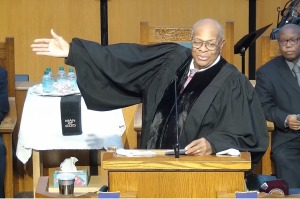‘Abuse of power’: Christian group slams Democrats’ push for IRS investigation of ‘church’ status

A prominent conservative Christian advocacy organization is denouncing efforts by several Democrats in the U.S. Congress to have the Internal Revenue Service investigate the organization's official designation as an "association of churches."
The Family Research Council, a socially conservative organization based in Washington, D.C., has recently garnered controversy for having the IRS grant it the status of an "association of churches."
Democratic representatives sent a letter on Monday to U.S. Treasury Secretary Janet Yellen and IRS Commissioner Charles P. Rettig. The letter came in response to a report published by ProPublica last month, which found that FRC filed an application with the IRS seeking reclassification as an "association of churches" in 2020. The IRS under the Trump administration approved the reclassification that summer.
FRC President Tony Perkins defended the new designation in a statement emailed to The Christian Post on Thursday, noting that the organization had changed its designation previously in 2005.
"In 2005, FRC shifted its 501(c)(3) status from an education non-profit to a religious non-profit. This change was made to reflect our mission," Perkins stated.
"Additionally, this change was required so that we could be an organization that has a statement of faith, and has the ability to hire people and pursue our mission in accordance with our faith and not be imposed upon by regulations from the local government."

According to Perkins, FRC "applied for an IRS designation as an association of churches" because it "more accurately reflects our expanding ministry work."
"Based upon a lengthy application process and audit of our activities, the IRS granted our status as an association of churches," he added.
Perkins denounced the recent effort by 40 Democrat members of the U.S. House of Representatives to have FRC's status reviewed, saying in the statement that they "continue in their efforts to weaponize the IRS and the government against Christian organizations like Family Research Council with whom they disagree."
"This is an egregious abuse of power," he asserted. "The Democratic Party's attempts to silence religious organizations, with whom they disagree, will not stop with FRC."
"If their targeting of FRC succeeds, they will turn their efforts towards churches that also teach and preach biblical truth," he warned. "This is not speculation. Since September 2019, House Democrats have sought to eliminate the tax exempt status of Christian groups that they deem 'hate groups.'"
The Democratic representatives wrote in their letter that they are concerned with "the Family Research Council's (FRC) tax-exempt status as an 'association of churches.'"
"In addition, we request a review of the existing Internal Revenue Service (IRS) guidance related to political advocacy organizations self-identifying as 'churches' to obtain the status of churches, integrated auxiliaries, and conventions or associations of churches," the letter states.
The letter contends that the FRC's claim of being a church "strains credulity," noting that "they do not hold religious services, do not have a congregation or affiliated congregations, and do not possess many of the other attributes of churches listed by the IRS."
The lawmakers identified FRC as "one example of an alarming pattern in the last decade – rightwing advocacy groups self-identifying as 'churches' and applying for and receiving church status."
"Tax-exempt organizations should not be exploiting tax laws applicable to churches to avoid public accountability and the IRS's examination of their activities," they proclaimed.
Members of Congress who signed the letter included Suzan DelBene of Washington, Jared Huffman of California, Donald Beyer of Virginia, Eleanor Holmes Norton of the District of Columbia, Rashida Tlaib of Michigan, Adam Schiff of California, Debbie Wasserman Schultz of Florida and Rick Larsen of Washington, among others.
In its report, ProPublica cited documents received via the Freedom of Information Act, speculating that the group sought a reclassification to reduce financial accountability.
"Once the IRS blessed it as an association of churches, the FRC was no longer required to file a public tax return, known as a Form 990, revealing key staffer salaries, the names of board members and related organizations, large payments to independent contractors and grants the organization has made," states the report.
"Unlike with other charities, IRS investigators can't initiate an audit on a church unless a high-level Treasury Department official has approved the investigation."
On Form 1023, which organizations seeking classification as an "association of churches" must complete, FRC answered in the affirmative to a series of questions designed to determine whether an organization meets the definition of an "association of churches."
Specifically, the organization maintained that it had a "written creed, statement of faith, or summary of beliefs," "a form of worship," "a formal code of doctrine and discipline" as well as a "distinct religious history."
"FRC conducts regularly scheduled worship services at its headquarters," the form explains. "Local churches who share FRC's Christian beliefs, core values and sense of mission may associate with FRC (and other churches) to jointly pursue their common beliefs and mission."
Stressing that "all FRC partner churches have regularly scheduled worship or prayer services, at least weekly and often more frequently," the document listed the church's shared mission as "to hold all life as sacred, to see families flourish, and to promote religious freedom."





























